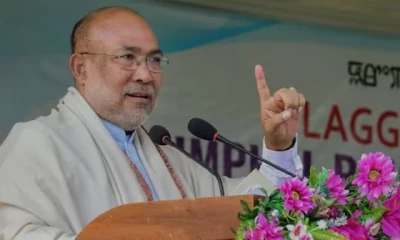In the midst of constant ethnic tensions in Manipur fuelled by multiple external factors, Chief Minister N Biren Singh has announced plans to identify and deport individuals, who entered and settled in this Northeastern State after 1961.
Speaking at the launch event of Project Buniyaad – Aathmanirbharta Ka Aadhar in State capital Imphal, CM Biren addressed the pressing issue of ensuring the survival and identity of Manipuri natives.
He asserted the current crisis “is one of struggle for existence, survival, and identity”, characterised by insecurity over property and identity “inherited over centuries” owing to “the lack of vision of certain politicians”. Consequently, the Manipur Government is working to make the current generation’s future secure, assured the CM.
CM Biren Singh underscored the government’s commitment to safeguarding the State’s integrity by curbing illegal immigration, drug trafficking, and arms smuggling. Measures such as erecting fences and scrapping the free movement regime or FMR are part of the strategy to achieve this goal.
His announcement follows the Manipur Cabinet’s decision in June 2022 to adopt 1961 as the base year for determining the ‘native status’ of the State residents, a move aimed at effectively implementing the Inner Line Permit or ILP system.
In December 2019, the Central Government extended the ILP regime to Manipur to address concerns raised against the Citizenship Amendment Bill. Consequently, Manipur became the fourth State, after Arunachal Pradesh, Mizoram and Nagaland to enforce the ILP regime.
While the State Government’s decision has drawn attention and concern, Naga leader and Forum for Restoration of Peace convenor Ashang Kashar pressed upon the need for careful implementation. Kashar stressed the importance of identifying immigrants and advocated for restricting their rights, including voting privileges, to protect the interests of original inhabitants.
An insider from the Manipur Government informed over 2,000 individuals remained in the State post ousting of Aung San Suu Kyi’s elected government in February and subsequent upheveal in 2021.
Imphal valley-based COCOMI acknowledged the role of illegal immigration in plaguing the State. They called for taking lessons from Assam’s National Register of Citizens or NRC to effectively identify and address the presence of illegal immigrants.
COCOMI spokesperson Khuraijam Athouba mentioned, “This is the core of today’s conflict. We can learn from Assam’s NRC experience. The first thing to do is to identify the illegal immigrants.”
It is worth noting that Manipur has been grappling with periodic episodes of violence since ethnic clashes erupted in May 2023, resulting in over 180 casualties to date. As the State navigates these challenges, the enforcement of deportation measures signals a significant step in addressing longstanding issues of immigration and ensuring the security of Manipuri natives.

















